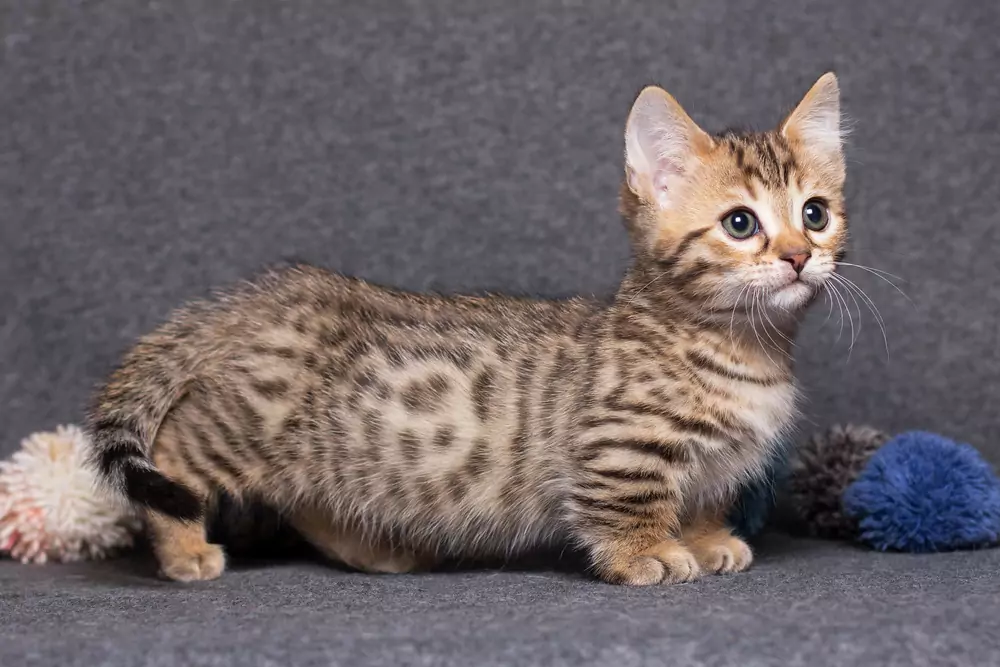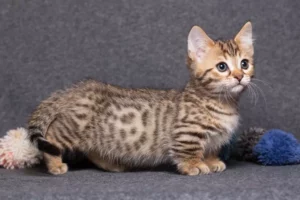0

Been wondering about munchkin cat health problems? They have really small legs and are fluffy and lovely.
You already know how adorable Munchkin cats are if you’ve recently seen one. Yet, you might also be asking if munchkin cats have any health issues. Do they have shorter legs that make them more prone to specific ailments? Are they interbred? And how in the world will they be able to jump into bed with you for cuddles?
Your “what ifs” may be filling your brain with water. But take a “paws” to read this post first before you find yourself in a terrifying sea of unknowns. You’ll learn potential health issues and how to avoid them.
Are you prepared to learn whether the Munchkin cat is the best cat to adopt into your family? Let’s start now!
The history of the Munchkin Cat has an interesting beginning. That’s as a result of their accidental 1983 discovery. A teacher discovered a Munchkin cat under her car as she was driving to work. After bringing the cat home, she discovered that it was expecting kittens.
When those kittens were born, surprise, more of them had short legs!
Even so, the Munchkin cat is still not recognized as a breed by many cat organizations. This is owing to the controversy surrounding the morality of breeding these cats. This is because their short legs are the result of a genetic abnormality.
As a relatively new breed of cat, there are still many unanswered questions. about Munchkin cats’ health issues.
Munchkins may be more susceptible to certain health issues. This is due to the genetic mutation that causes these cats’ short legs. This is especially true for Munchkins that have been bred with cats that have health issues.
There is an ongoing discussion on whether the Munchkin cat’s tiny legs are a result of heredity.
To procreate, Munchkin cats must be mated with cats that are not Munchkins. This is so because the gene responsible for Munchkin cats’ small legs is a deadly gene.
Any kittens produced by two Munchkin cats would not survive. But it doesn’t mean there aren’t health issues with Munchkin cats. Munchkins may be prone to specific health issues.
Five Common Health Issues & Symptoms for Munchkins
You’ll want to learn as much as you can about this cat, whether you’ve already adopted one or are still debating it. Here are five typical health issues that affect Munchkin cats. Along with descriptions of each condition’s signs.
Even humans can develop hyperthyroidism. So you may have heard of the illness before.
When your cat’s thyroid goes awry and begins to overproduce hormones. This condition is known as hyperthyroidism. Older cats are more affected by this health issue.
The following signs of hyperthyroidism in a Munchkin cat may be present:
Bring your cat to the doctor for an examination if you observe any of these signs. Your vet will request an X-ray plus various tests if they suspect this illness.
Your vet may recommend drugs to lower the production of thyroid hormones if the cat is sick. Additionally, she might advise surgery or dietary adjustments for your cat.
Yet, you shouldn’t worry a lot. Cats with hyperthyroidism react well to treatment and can have long, fulfilling lives.
Cat arthritis. This is a degenerative joint ailment that causes your cat’s cartilage to deteriorate.
By cushioning joints while your cat moves about, cartilage helps safeguard its bones.
As a result, when this cartilage begins to deteriorate. Then the Munchkin cat’s bones may start to rub against one another.
Indeed, arthritis hurts as bad as it sounds. Unfortunately, cats tend to have this illness. Especially as they get older. But, don’t assume that kittens are immune to arthritis.
Take your cat to the veterinarian for a checkup if you detect any of the following signs:
Since arthritis cannot be cured, the main goals of treatment are to lessen pain.
Like humans, giving your cat joint supplements can support their joints. It will also ease pain and inflammation. Fortunately, giving your cat a joint supplement can also work wonders. It could prevent arthritis from ever occurring. Your vet might advise surgery if your cat has an especially bad case of arthritis.
Unfortunately, the situation is just as serious as it seems. Some people could even refer to it as the lord of all spinal issues. When a cat’s spine muscles are too short, lordosis develops. The main sign of this illness is a curving of the cat’s spine.
You’ll most likely realize your Munchkin cat has lordosis fairly early on. You can catch this problem soon after birth in many situations.
Surgery is used to treat lordosis when it can, and the severity of the condition can vary. Sadly, because severe lordosis is so difficult to cure, it frequently results in euthanasia or death during or soon after birth.

Uremia is the next health issue on our list of Munchkin cat health issues. When your cat’s blood contains a lot of urea, this disease develops.
The natural way for urea to exit her body is through urination. Numerous factors, such as damaged kidneys may contribute to this.
Your cat may have uremia if you see any of the following signs:
Your veterinarian will do blood tests to identify this disease. Additionally, the course of treatment will depend on the underlying cause of uremia. Unfortunately, problems from uremia are fairly common in cats. These side effects could be fatal and could vary from seizures to cardiac arrest.